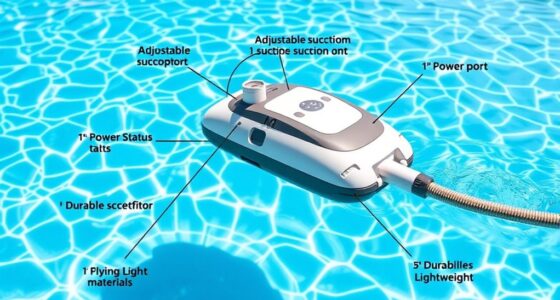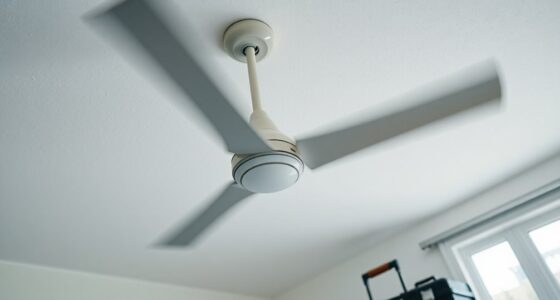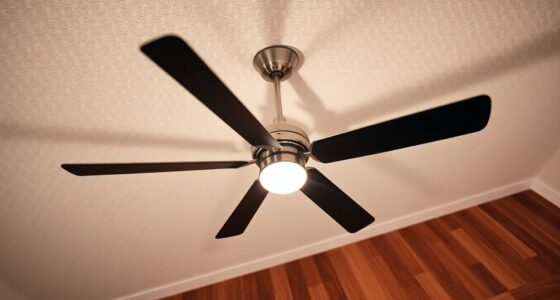Automatic pool cleaners typically last between 2 to 7 years, depending on their type, usage, and maintenance. Robotic models usually reach 3 to 5 years, while pressure and suction-side cleaners can last slightly shorter or longer with proper care. Factors like harsh weather, chemical exposure, and debris load can affect their lifespan. To get the most out of your cleaner and learn tips on extending its life, keep exploring these important details.
Key Takeaways
- Most robotic pool cleaners last between 3 to 5 years, with some models reaching up to 7 years with proper maintenance.
- Pressure-side and suction-side cleaners typically have a lifespan of 3 to 5 years and 2 to 4 years, respectively.
- Signs of end-of-life include reduced debris pickup, irregular movement, error messages, and unusual noises.
- Regular maintenance, such as cleaning filters and inspecting components, can extend the lifespan of your pool cleaner.
- Environmental factors like chemicals, debris overload, and weather exposure can shorten the lifespan of automatic pool cleaners.
Factors That Influence the Lifespan of Automatic Pool Cleaners
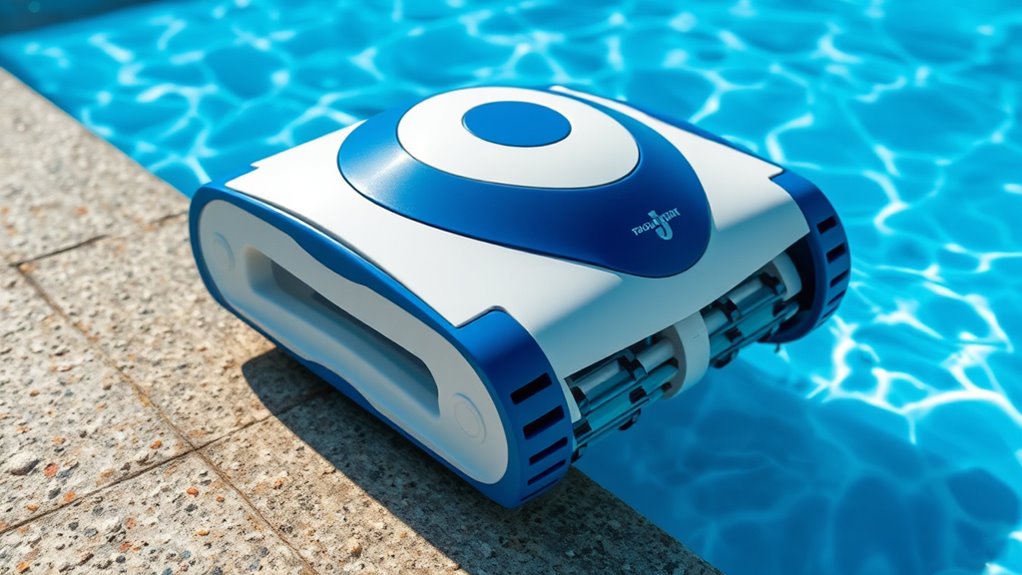
Several key factors determine how long your automatic pool cleaner will last. One important aspect is the pool cleaner warranties, which can give you insight into the expected durability and manufacturer confidence. A longer warranty often indicates higher quality and better construction, helping you avoid premature replacements. Additionally, the environmental impact plays a role; cleaners exposed to harsh weather, chemicals, and debris can wear out faster. Proper maintenance, like regular cleaning and avoiding abrasive surfaces, extends their lifespan. The quality of materials used also influences durability—robust components withstand daily use better. Furthermore, material quality in pool cleaners impacts their overall longevity, ensuring they can handle the demands of regular use. Proper storage and avoiding exposure to extreme temperatures can also help prolong their lifespan. Environmental exposure can accelerate wear and tear, so protecting your cleaner from harsh conditions is essential. Additionally, regular maintenance plays a crucial role in preventing early breakdowns and ensuring optimal performance. Ultimately, understanding these factors helps you choose a reliable cleaner and ensures it performs efficiently for years, reducing waste and minimizing environmental harm.
Average Duration of Different Types of Pool Cleaners

Understanding how long different pool cleaners last helps you choose the right one for your pool. Robotic cleaners typically last around 3 to 5 years, while pressure-side models can be more durable but may need repairs sooner. Suction-side cleaners usually have a shorter lifespan, often around 2 to 4 years, depending on usage and maintenance. Additionally, choosing a Kia Tuning compatible model can extend the longevity of your pool cleaning equipment through proper maintenance and upgrades. Proper care and awareness of material durability can further prolong the lifespan of your pool cleaner, especially when considering components similar to those in Mazda Tuning. Regular inspections and timely replacements of worn parts, similar to how Honda Tuning emphasizes component upgrades, can significantly enhance your cleaner’s lifespan.
Robotic Cleaner Lifespan
Robotic pool cleaners are known for their durability, often lasting longer than traditional options when properly maintained. Typically, a robotic cleaner from reputable pool cleaner brands lasts between 3 to 7 years, depending on usage and care. Because they are automatic, these cleaners require less manual effort, but they still need regular cleaning and occasional part replacements. Proper maintenance is key to maximizing your cleaner’s lifespan and ensuring it operates efficiently over time. To enhance longevity, it’s important to use the correct power supply and avoid exposing the device to extreme weather conditions. Compared to manual pool cleaners, robotic models tend to have a longer lifespan due to fewer moving parts exposed to wear and tear. The lifespan also varies based on the quality of the device and how often you run it. Investing in a high-quality robotic cleaner can extend its longevity, making it a cost-effective choice over time. Additionally, understanding Vetted privacy policies and cookie management can help users feel more secure when browsing online about product reviews and purchasing options.
Pressure Side Durability
Pressure side pool cleaners are generally durable, but their longevity depends on the specific type and how well you maintain them. Proper pool chemical balance reduces wear on components, preventing corrosion and buildup that can shorten their lifespan. Additionally, choosing the right pool cover helps protect the cleaner from debris and harsh weather, which can cause damage over time. Regularly inspecting hoses and fittings ensures they stay secure and prevent unnecessary strain. Well-maintained equipment can last several seasons, typically around 3 to 5 years, depending on usage and environmental conditions. Using appropriate cleaning techniques can further extend the lifespan of your pressure side cleaner. Incorporating proper maintenance routines ensures all parts function optimally and reduces the risk of premature failure. Keeping the manufacturer’s guidelines in mind when caring for your cleaner will help maximize its durability and keep it running efficiently longer. Moreover, understanding wear and tear factors can help you anticipate potential issues before they lead to major repairs. Proper storage practices during off-season periods also play a crucial role in extending the lifespan of your pool cleaner.
Suction Side Longevity
Suction side pool cleaners typically last between 3 to 7 years, depending on the model and your maintenance habits. To maximize their lifespan, check the pool cleaner warranties and follow the manufacturer’s guidelines. Regularly clean and inspect the hoses, brushes, and filters to prevent clogs and wear. If a part fails, consider DIY repairs if you’re comfortable, as many issues are simple to fix and can extend your cleaner’s life. Proper maintenance reduces strain on the motor and suction system, helping it perform efficiently for longer. Keep in mind that cheaper models may have shorter lifespans, but diligent care can make a significant difference. Additionally, durable construction and the use of non-toxic finishes can impact the overall longevity of your pool cleaner. Regularly updating your knowledge of industry trends can help you choose better-maintained models in the future. Staying on top of filter replacement and routine cleaning ensures your suction pool cleaner remains effective for as many years as possible. Monitoring air quality indicators in your pool environment can also assist in maintaining optimal cleaner performance over time. Moreover, choosing a model with high-quality materials can further extend its operational life.
Signs Your Pool Cleaner Is Nearing the End of Its Life
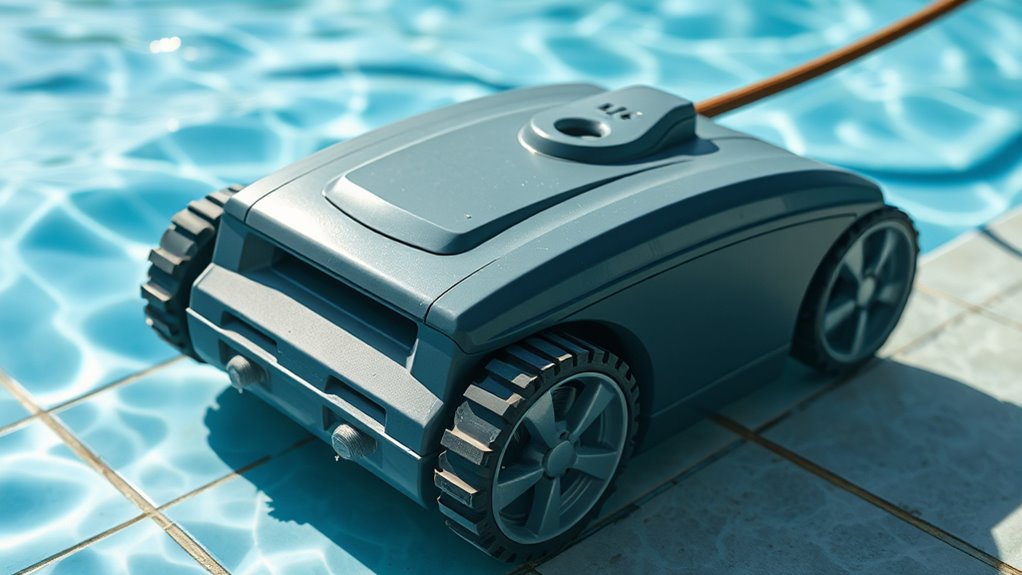
If your pool cleaner isn’t working as well as it used to, it might be a sign it’s nearing the end of its life. Watch for decreased cleaning efficiency, strange noises, or vibrations during operation. Frequent malfunctions or error messages are also clear indicators you may need a replacement soon. Additionally, vetted models tend to have a longer lifespan and better performance over time. Proper maintenance and timely parts replacement can also extend the lifespan of your pool cleaner. Incorporating data-driven strategies for maintenance can help identify issues early and optimize performance. Regularly inspecting the performance and functionality of your cleaner can further ensure it operates at peak efficiency and prolong its life.
Decreased Cleaning Efficiency
As your pool cleaner starts to lose its effectiveness, you may notice that it no longer picks up debris as thoroughly as it used to. This decline can be due to issues like clogged filters or worn brushes, which hinder cleaning performance. You might also observe that your cleaner struggles with areas affected by changing pool chemistry or solar heating, causing buildup of algae or dirt. To help diagnose problems, consider this chart:
| Issue | Symptom | Possible Cause |
|---|---|---|
| Reduced debris pickup | Debris remains after cleaning | Worn brushes or clogged filter |
| Slow movement | Cleaner stalls or moves irregularly | Motor wear or blockage |
| Uneven cleaning | Missed spots around pool | Obstructions or calibration issues |
| Increased cleaning time | Takes longer to clean entire pool | Dirty filters or debris buildup |
| Shorter cycle duration | Cleaner stops early | Battery or power issues |
Regular maintenance, including inspecting filter components, is essential to ensure your pool cleaner operates efficiently. Additionally, consider checking the gearing system periodically, as wear can impact movement and cleaning effectiveness. Keeping an eye on these signs helps you determine if your cleaner is nearing the end of its lifespan.
Unusual Noise or Vibration
Unusual noises or vibrations from your pool cleaner often indicate that it’s nearing the end of its lifespan. If you notice unexpected noises, like grinding or squealing, it’s a sign that parts may be worn or damaged. Similarly, vibration issues—such as excessive shaking or wobbling—can point to motor problems or unbalanced wheels. These sounds and movements are your warning signs that your cleaner is struggling to operate smoothly. Ignoring these signs can lead to further damage or complete failure. Regularly listening for unusual noises and feeling for abnormal vibrations helps you catch issues early. If you detect these signs, it’s a good idea to inspect your cleaner, tighten loose parts, or consider replacing worn components before it stops working altogether.
Frequent Malfunctions or Errors
Frequent malfunctions or error messages are clear indicators that your pool cleaner is nearing the end of its lifespan. If you notice your cleaner repeatedly getting stuck, failing to navigate, or displaying error codes, it’s a sign to take action. Common issues across pool cleaner brands include motor failures, clogged filters, or sensor malfunctions. These problems often point to wear and tear or underlying mechanical faults. Check if your unit is still under warranty coverage, as repairs or replacements might be covered. Ignoring these signs can lead to more costly repairs or the need for a new cleaner. Regular maintenance can help extend its life, but persistent errors suggest it’s time to contemplate a replacement. Keep an eye on these warning signs to protect your investment.
Proper Maintenance to Extend Your Pool Cleaner’s Service Life

Proper maintenance is essential to guarantee your pool cleaner lasts as long as possible. Sticking to regular maintenance routines and cleaning schedules prevents buildup of debris and reduces wear. After each use, rinse your cleaner thoroughly to remove dirt and chemicals that can degrade parts. Inspect brushes, filters, and hoses regularly, replacing any worn or damaged components promptly. Keep the drive wheels free of obstructions, and clear out filters to ensure ideal suction. Avoid skipping scheduled cleanings, as neglecting routine upkeep can lead to malfunctions and shorten the lifespan. Proper storage during the off-season also helps prevent damage. By staying diligent with these simple steps, you extend your cleaner’s service life and ensure it continues to operate efficiently for years to come.
How Usage Frequency Affects Longevity
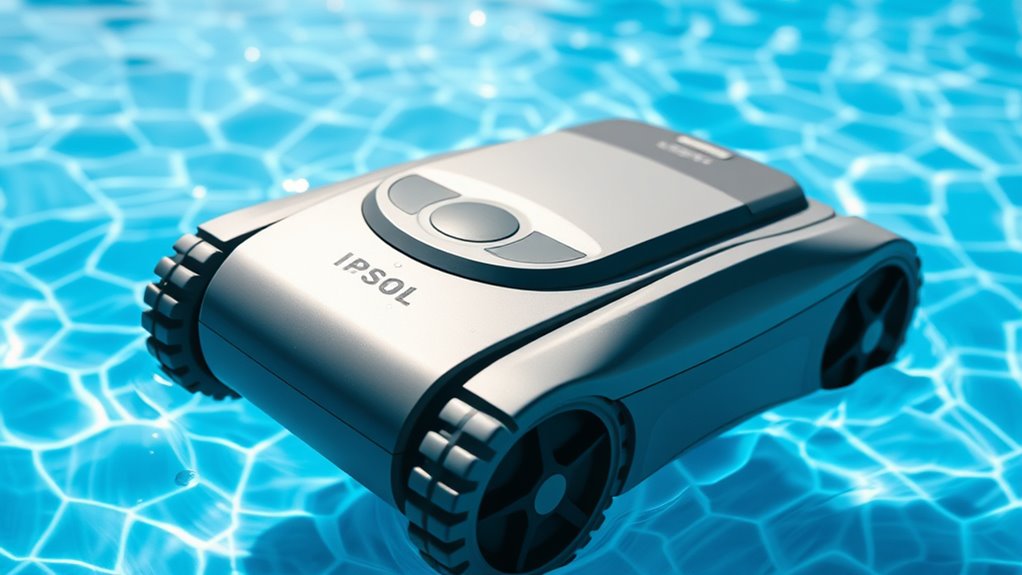
The more often you run your pool cleaner, the quicker its parts can wear out. Frequent use accelerates wear on brushes, tracks, and motors, reducing lifespan. To maximize longevity, pay attention to pool chemistry—balanced pH and chlorine levels prevent buildup that strains the cleaner. Additionally, proper seasonal storage when not in use safeguards components from corrosion and damage.
Consider these tips to protect your investment:
- Limit cleaning sessions during peak debris periods to reduce strain
- Regularly inspect and clean filters to prevent motor overload
- Store your cleaner in a dry, cool place during off-season
- Maintain ideal pool chemistry to prevent residue buildup
Common Causes of Pool Cleaner Malfunctions and Wear

Understanding the common causes of pool cleaner malfunctions and wear can help you keep your device running smoothly. One key issue is chemical compatibility; harsh chemicals or imbalanced pool water can degrade parts and damage internal components. Regular exposure to chlorine, algaecides, or other chemicals may cause plastics and seals to deteriorate faster. Additionally, high power consumption can indicate motor strain or electrical problems, leading to premature failure. Overloading your cleaner with debris or neglecting regular maintenance increases wear on brushes, wheels, and filters. Clogged or damaged parts force the motor to work harder, raising energy use and risking breakdowns. By monitoring chemical levels and ensuring your cleaner operates within recommended power parameters, you can extend its lifespan and reduce malfunctions.
Upgrading or Replacing Parts to Improve Durability

Upgrading or replacing parts of your pool cleaner can substantially boost its durability and performance. Regular part replacement prevents wear from causing breakdowns, extending its lifespan. Durability enhancements, like switching to more resilient components, help your cleaner handle tougher debris and longer use. Consider replacing worn brushes, filters, or drive belts before they fail completely. Upgrading seals and wheels can reduce leaks and improve mobility, while swapping out old brushes for sturdier options enhances cleaning efficiency. These proactive measures ensure your cleaner operates smoothly and lasts longer, saving you money in the long run. Staying on top of part replacement and durability improvements keeps your pool cleaner in top shape, minimizing downtime and maximizing its useful life.
Cost-Effective Tips for Maintaining Your Pool Cleaner

Maintaining your pool cleaner without breaking the bank is all about smart, cost-effective practices. Focus on optimizing energy efficiency by regularly cleaning and inspecting filters, which keeps the cleaner running smoothly and reduces power consumption. Choose models with a strong brand reputation, as reputable brands typically produce more durable, efficient cleaners that save you money over time. Proper storage during off-season periods prevents unnecessary wear and tear, extending your cleaner’s lifespan. Avoid running the cleaner during peak heat hours to conserve energy. Regular maintenance and prompt repairs prevent costly replacements. Investing in high-quality parts from trusted brands can also improve efficiency, ensuring your pool cleaner works effectively longer. These simple steps help you save money while keeping your pool pristine.
When to Consider Replacing Your Automatic Pool Cleaner
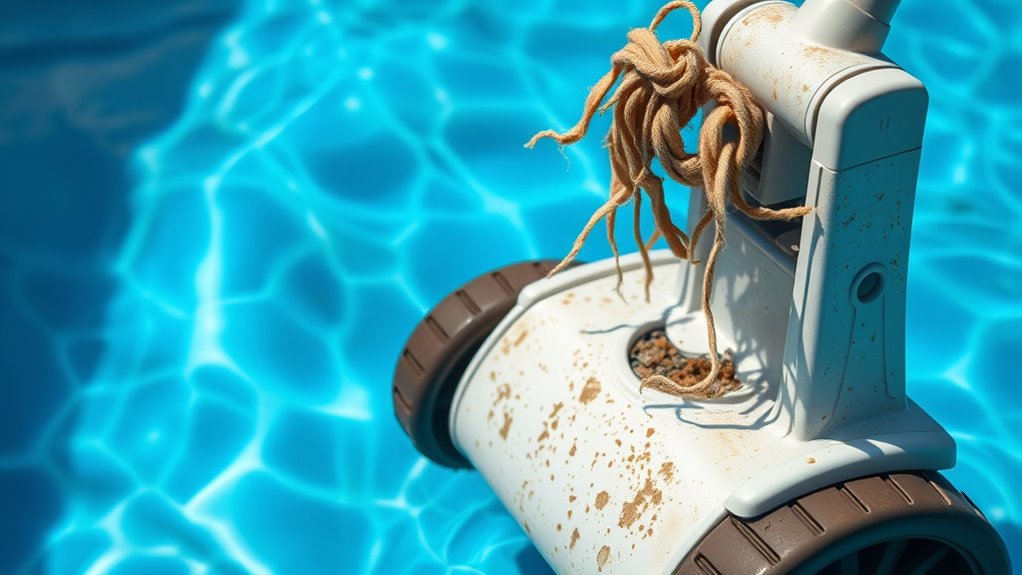
While regular maintenance can extend the life of your pool cleaner, there comes a point when repairs no longer make economic sense. If your cleaner repeatedly breaks down despite troubleshooting, it’s time to contemplate replacement. Poor pool installation or neglecting proper chemical balance can accelerate wear, making repairs costlier. Signs you should replace your cleaner include declining cleaning efficiency, persistent mechanical issues, or frequent repairs. Additionally, if your pool’s chemical balance isn’t maintained, it can damage the unit’s components faster. When these problems persist despite repairs, investing in a new automatic pool cleaner becomes more practical. Don’t ignore these signs—timely replacement ensures your pool stays clean without draining your budget.
When repairs become costly and cleaning declines, replacing your pool cleaner is the practical choice.
- Frequent breakdowns despite repairs
- Reduced cleaning effectiveness
- Chemical imbalance harming parts
- Outdated technology or damage
Long-Term Investment: Choosing a Durable Pool Cleaner
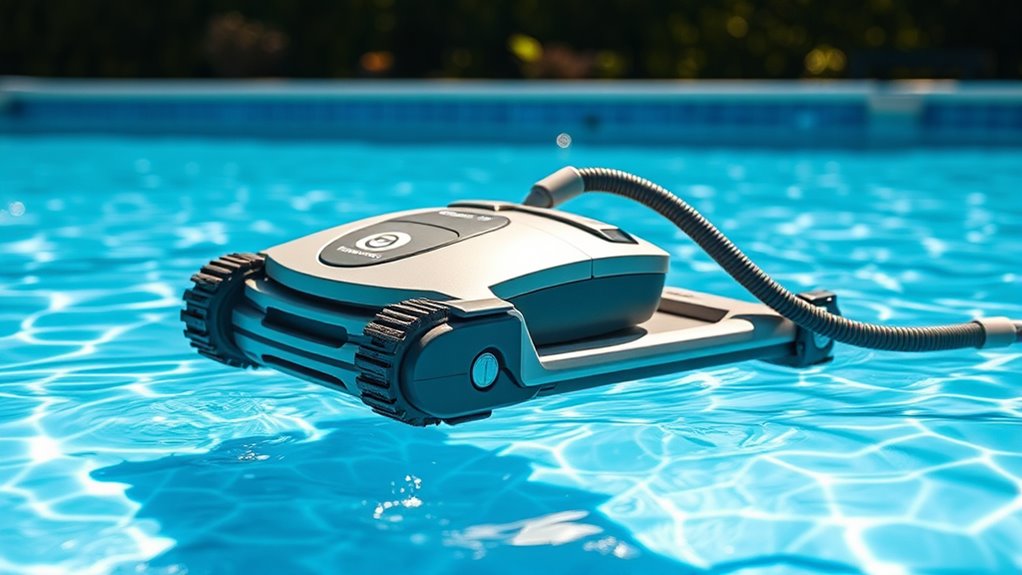
Choosing a durable pool cleaner is essential for making a long-term investment that pays off over time. When selecting a model, check the pool cleaner warranties offered, as they reflect confidence in its durability and provide peace of mind. Consider environmental factors like pool size, water chemistry, and debris levels, which can impact the cleaner’s lifespan. A sturdy build with high-quality parts withstands harsh conditions better, reducing the need for repairs or replacements. Investing in a reputable brand with good warranty coverage ensures you’re protected against early failures. Remember, a well-chosen, durable cleaner not only cleans efficiently but also saves you money and frustration in the long run. Prioritize quality, warranties, and environmental compatibility to maximize your pool cleaner’s longevity.
Frequently Asked Questions
Can Temperature Fluctuations Affect the Lifespan of My Automatic Pool Cleaner?
Temperature fluctuations can impact your automatic pool cleaner’s lifespan. When it gets too hot or cold, it may cause the motor to work harder, reducing motor longevity. Extreme temperatures can also weaken seals and plastic components, making it harder to clean effectively. Additionally, temperature changes can affect how well your cleaner handles pool debris. To keep it running smoothly, try to maintain a consistent temperature environment around your pool cleaner.
How Do Storage Conditions Impact the Durability of Pool Cleaners?
Storage conditions play a vital role in your pool cleaner’s durability. If you store it in a dry, cool place, it’s less likely to develop mold or damage. Avoid leaving it exposed to extreme temperatures or direct sunlight. Also, maintaining a regular cleaning frequency guarantees it stays in good shape. Proper storage and consistent cleaning help extend your cleaner’s lifespan, saving you money and hassle in the long run.
Are There Specific Brands Known for Longer-Lasting Automatic Pool Cleaners?
When choosing an automatic pool cleaner, you want a brand with a strong reputation for durability. Some brands are known for producing models that last longer, especially when you follow proper maintenance routines. Regularly cleaning filters, inspecting brushes, and storing your cleaner properly can extend its lifespan. Investing in reputable brands and maintaining your equipment helps guarantee your cleaner stays efficient and lasts for years, saving you money over time.
Does Frequent Use Accelerate the Wear and Tear of Pool Cleaning Devices?
They say, “A stitch in time saves nine,” and that’s true for your pool cleaner, too. Frequent use doesn’t necessarily speed up wear and tear if you perform regular maintenance. Proper upkeep reduces the impact of constant operation. However, neglecting maintenance can lead to quicker breakdowns. So, stay consistent with your maintenance frequency to keep your automatic pool cleaner running smoothly, regardless of how often you use it.
What Warranty Coverage Is Typical for Automatic Pool Cleaners?
Automatic pool cleaners usually come with a warranty that ranges from one to two years. You should check the coverage details carefully, as most warranties cover parts and labor for manufacturing defects but may exclude damage caused by misuse or wear and tear. Be sure to register your product and keep proof of purchase to guarantee you can easily access warranty services if needed.
Conclusion
Your automatic pool cleaner is like a loyal companion, working tirelessly to keep your pool pristine. With proper care and regular maintenance, it can last several seasons, saving you money and hassle. Keep an eye on signs of wear, and don’t hesitate to upgrade when needed. Think of it as a trusted friend—nurture it, and it’ll serve you well, making your pool time as smooth and invigorating as a gentle ocean breeze.


